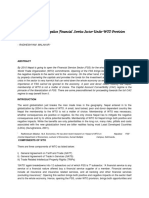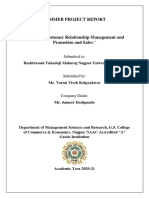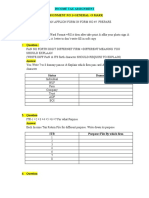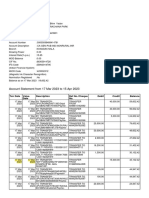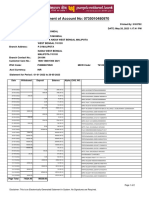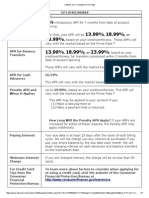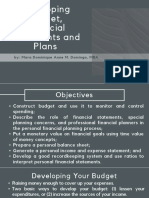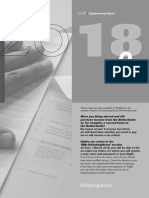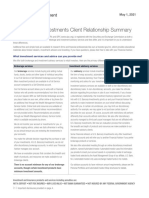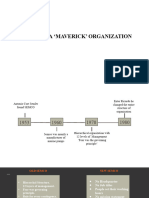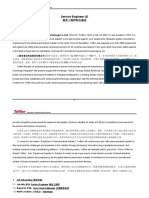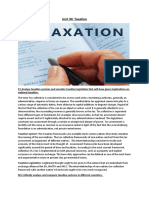Citigroup Global Markets Inc.
Client Relationship Summary December 31, 2022
Citigroup Global Markets Inc. (“we” or “us”) is registered as a broker-dealer and an investment adviser with the U.S. Securities
and Exchange Commission. We are also a member of the Financial Industry Regulatory Authority, Inc. and the Securities Investor
Protection Corporation. We offer both brokerage and investment advisory services. Those services and the fees we charge for
them differ, and it is important for you to understand the differences. This relationship summary is designed to provide you with
information about the different services that we offer and how we charge for those services. Free and simple tools are available
to research firms and financial professionals at Investor.gov/CRS, which also provides educational materials about broker-dealers,
investment advisers, and investing.
What investment services and advice can you provide me?
We offer a variety of brokerage and investment advisory services to our clients and to clients of our affiliates. Your financial
professional may offer you brokerage services, investment advisory services, or both. Some of the key differences between our
brokerage and investment advisory services are described below.
Brokerage Services • An investment advisory account provides you access to
a broad range of investment products, such as stocks,
• Brokerage services include taking your orders and
bonds, options or other derivatives, ETFs, mutual funds,
executing your securities transactions, making
and alternative investments. The range of products
recommendations for you to buy, sell, or hold securities,
available to you will vary depending on your investment
and arranging for safekeeping of your securities.
advisory program.
• A brokerage account provides you access to a broad range
• In most investment advisory account programs, you will
of proprietary and non-proprietary investment products,
grant us or a third-party adviser discretion to buy and
such as stocks, bonds, options or other derivatives,
sell investments in your account without asking you in
exchange-traded funds (“ETFs”), mutual funds, margin
advance. We have the discretion to effect any transaction
lending, and alternative investments.
with respect to your accounts without first obtaining your
• We provide recommendations to you on specific consent, and, as a result, decisions to purchase or sell
investments, but you make final investment decisions. securities or other investments shall be made by us and not
• After we provide investment recommendations, we are not by you. We only have this discretion to make such decisions
required to monitor any investments you make. or investments under the terms of that investment. If you
request, we may agree to limit our discretion, such as
• Your brokerage account may have specific account by implementing reasonable restrictions on investing in
requirements, such as an account or investment minimum certain securities or groups of securities.
or restrictions based on residency or a relationship with a
specific line of business. • Some investment advisory accounts are non-discretionary,
which means that you are required to pre-approve each
Ask us: Given my financial situation, should I choose an investment transaction that we recommend. In a non-
investment advisory service? Should I choose a brokerage discretionary account, you make the ultimate decision
service? Should I choose both types of services? Why or why not? regarding the purchase and sale of each investment. Some
How will you choose investments to recommend to me? What accounts combine both discretionary and non-discretionary
is your relevant experience, including your licenses, education, features. This includes services where you establish a
and other qualifications? What do these qualifications mean? general asset allocation model and we select the specific
investments for each asset class.
• We, or a third-party adviser, typically monitor accounts on an
Investment Advisory Services ongoing basis. In limited-scope advisory relationships, such
• We provide investment advisory services including wrap as financial planning, we will not provide ongoing monitoring.
fee programs, asset allocation programs, unified managed • Your investment advisory program may have specific
account programs, advisory programs involving one or requirements to open or maintain an account, such as an
more third-party investment advisers, non-discretionary account or investment minimum or restrictions based on
advisory accounts, financial planning services, automated residency or a relationship with a specific line of business.
advice programs, and other custom advisory services.
Detailed information about our brokerage and investment advisory services can be found by accessing Parts One and Four of our
Regulation Best Interest Disclosure Statement and Related Information for Retirement Accounts and Item 4 of our Form ADV.
Links to those documents are included on page 4.
INVESTMENT AND INSURANCE PRODUCTS: NOT FDIC INSURED • NOT CDIC INSURED • NOT A BANK DEPOSIT • NOT INSURED BY ANY FEDERAL
GOVERNMENT AGENCY OR ANY GOVERNMENTAL AGENCY OUTSIDE OF THE UNITED STATES • NO BANK GUARANTEE • MAY LOSE VALUE
1
�What fees will I pay?
Charges Associated with Brokerage Services Fees Associated with Investment Advisory Services
• For brokerage services, we typically charge a transaction- • For investment advisory services, we typically charge an
based expense each time you buy or sell an investment. ongoing fee based on the assets in your account (sometimes
For purchases and sales of stocks, ETFs, options, and bonds referred to as a “management fee”). This fee is calculated
traded on an agency basis, this amount is charged separately as a percentage of the value of your account and generally
and is referred to as a “commission;” for purchases of will be payable monthly or quarterly, depending on your
mutual funds, this charge is commonly called a “load” and account program. You pay this fee even if you do not buy
liquidations of mutual funds may bear other charges. For or sell investments.
purchases and sales of bonds traded on a principal basis, the • The more assets you have in an asset-based fee account,
charge is incorporated into the security price and is known as the more you will pay us in fees. This gives us an incentive
a “mark-up” or “mark-down,” respectively. to encourage you to increase the size of your account.
• The amount you pay as a commission varies according • Your fee rate may differ from other clients in the same
to the particular investment and/or amount invested. In account program based on the value of your account.
addition, the transaction-based cost for certain transactions In addition, the fees for some account programs are
is negotiable, which may result in some clients paying a negotiable, which may result in some clients paying a
lower amount than others for transactions in the same reduced fee or a fee that is not asset-based.
or similar investments. The more investment transactions
(“trades”) you make, the more transaction-based revenue • For “wrap fee program” accounts, you will pay us a single
we earn. This gives us an incentive to encourage you to asset-based fee for advisory services which also covers
trade often. most transaction costs and certain administrative and
custodial costs associated with your investments. You may
still bear transaction costs if there is a mark-up or mark-
down or if the investment adviser for your account directs
trades to a third-party broker-dealer. If you expect to trade
infrequently, a wrap fee program may cost you more than
paying for the program’s services separately.
Other Fees and Costs
In addition to the principal fees and costs described above, you may pay fees and costs at the account- and investment-levels.
The form and amount of your other fees and costs will vary depending on the product, account, and relationship you have
with us.
• Account-Level Fees: Account-level fees and costs include: You will pay fees and costs whether you make or lose money
(1) account maintenance fees, such as custody fees; (2) cash on your investments. Fees and costs will reduce any amount
management fees, such as electronic fund and wire transfer of money you make on your investments over time. Please
fees; (3) fees for transactions involving certain types of make sure you understand what fees and costs you are paying.
investment products, such as foreign securities; (4) fees Detailed information about fees and costs associated with our
and other costs, such as interest payments, for margin or advisory services can be found in our Firm’s Brochure. Detailed
other loans obtained from us or one of our affiliates that are information about fees and costs associated with our brokerage
secured by the assets in your account; and (5) advisory fees services can be found in our Regulation Best Interest Disclosure
for third-party investment advisers. Statement and Related Information for Retirement Accounts.
• Investment-Level Fees: Investment-level fees and costs are You can find more information on Citi Private Bank (“CPB”),
charged by the particular investment product in which you Wealth at Work (“WaW”), Citi Personal Wealth Management
are invested and are typically charged by mutual funds, (“CPWM”), Citi Personal Investments International (“CPII”)
ETFs, and alternative investment funds. Therefore, if you and Citi Institutional Clients Group (“ICG”) on their websites.
invest in these products, there may be two or more layers of • Detailed information about fees and costs can be found
fees and expenses for those investments: the fees charged by accessing Parts Two and Four of our Regulation Best
by the investment product, including advisory fees and other Interest Disclosure Statement and Related Information for
fees and expenses, and any fees charged by us. In addition Retirement Accounts, Item 4 of our Forms ADV for wrap
to advisory fees, certain investment products or their fee programs and Item 5 of our Forms ADV for financial
sponsors or affiliates charge fees based on the product’s planning. Links to those documents are included on page 4.
investment performance.
Ask us: Help me understand how these fees and costs might affect my investments. If I give you $10,000 to invest, how much will go to
fees and costs, and how much will be invested for me?
2
�What are your legal obligations to me when providing recommendations as my broker-dealer
or when acting as my investment adviser? How else does your firm make money and what
conflicts of interest do you have?
When we provide you with a recommendation as your broker-dealer or act as your investment adviser, we have to act in your
best interest and not put our interest ahead of yours. At the same time, the way we make money creates some conflicts with your
interests. You should understand and ask us about these conflicts because they can affect the recommendations and investment
advice we provide you. Here are some examples to help you understand what this means. Conflicts of interest will vary depending
on the product, account, and relationship you have with us.
• Proprietary Products: In some instances, we will recommend, us an incentive to recommend, or invest your assets in, the
or invest your assets in, investment products and lending products of sponsors that participate in revenue sharing,
products (including purpose and non-purpose loans) that are especially those product sponsors that share more revenue
issued, sponsored, or managed by us or our affiliates. We and with us than other product sponsors.
our affiliates receive compensation from these proprietary
• Principal Transactions: In our capacity as broker, we
products. This compensation gives us, and if shared with
sometimes buy securities from you for our own account,
your financial professional gives him or her, an incentive
sell securities to you from our own account, or engage in
to recommend proprietary products to you over non-
derivative transactions with you for our own account. We
proprietary products. In the case of an affiliated alternative
engage in these transactions, known as principal transactions,
investment fund, for example, your investment in the fund
in various contexts and they create conflicts between our
would increase the fund’s assets, and, as a result, increase
interests as buyer or seller — to buy from you at the lowest
the asset-based fee (and potentially any performance fee)
possible price or sell to you at the highest possible price — and
we earn from the fund. We have taken steps to mitigate
our responsibility not to put our interests ahead of yours. We
the conflicts of interest that arise from recommending, or
may also be incentivized to use principal transactions to sell
investing your assets in, proprietary products. For example,
you securities that we no longer want, or that others in the
if you invest in an affiliated alternative investment fund
market won’t purchase, or buy from you securities that are in
through an advisory account, you may not pay any additional
high demand, in each case at prices that are advantageous to
management fee to the affiliated adviser. However, if you
us. Because of these potential conflicts of interest, we have
enter into a separate contract with an affiliate of CGMI to
policies and procedures in place to mitigate the risk that we
invest in alternative investments, you may pay additional
could take advantage of you using principal transactions,
management fee to the affiliated adviser.
including an outright prohibition against engaging in principal
• Third-Party Payments: We and our affiliates receive transactions in certain circumstances.
compensation from some investment products, such
• Transactions with Other Customers: We may, from time to
as mutual funds and their sponsors, in connection with
time, facilitate securities transactions between you and our
investments you make in those products. We may receive
other customers. These transactions may lead to conflicts
a one-time payment (known as a “sales load” or a “sales
between our responsibilities to you, as our customer, and our
charge”) related to your purchase of a new investment
responsibilities to other customers.
or your purchase of an additional amount in an existing
investment. We may also receive ongoing compensation in • Hedging Transactions: We may, from time to time, take
the form of fees that the products charge you and then pay positions in relation to our principal transactions with you to
to us. This compensation may be based on the amount you hedge our financial risks relating to the transactions, or we
invest in a product or how long you hold the investment. may engage in hedging transactions on behalf of our other
In addition, we receive fees from investment products and customers. These hedging transactions may affect the price
their sponsors for providing certain services related to of the securities that you are purchasing or selling.
those products — such as distribution, administrative, and • Cash Credits and Rebates: Certain venues, such as
shareholder services. Our receipt of third-party payments alternative trading systems and exchanges, offer cash credits
gives us an incentive to recommend, or invest your assets in, or rebates for orders that provide liquidity to the venue and
investment products for which we receive these payments. charge explicit fees for orders that extract liquidity from the
We also share some of these payments with our financial venue. Other venues are inverted, meaning they offer those
professionals, which gives them a similar incentive to favor benefits for orders that remove liquidity and charge fees for
investment products that generate third-party payments. orders that provide liquidity. We route orders to exchanges
• Revenue Sharing: We and our affiliates receive revenue that provide these programs and we may be eligible for
sharing payments from certain investment product sponsors. these benefits under the relevant exchange rules. For any
Revenue sharing payments are payments from investment execution, you may request that we identify the venue where
product sponsors for administrative and other services we your transactions were executed, and advise whether we
provide for their products (such as mutual funds and variable netted a rebate from the venue during the relevant time
annuities). Unlike the third-party payments described period. These benefits incentivize us to route trades through
above, these payments are typically not paid directly from venues that provide the benefits.
the product but instead from the product sponsor’s own
assets. The revenue sharing payments we receive from Ask us: How might your conflicts of interest affect me, and how
these product sponsors generally are not shared with your will you address them?
financial professional, but the receipt of such payments gives
Detailed information about our conflicts of interest can be found by accessing Parts Three and Four of our Regulation Best
Interest Disclosure Statement and Related Information for Retirement Accounts and our Forms ADV. Links to those documents
are included on page 4.
3
�How do your financial professionals Do you or your financial professionals have
make money? legal or disciplinary history?
Our financial professionals earn a salary and typically receive Yes. A free and simple search tool to research us and our
variable compensation, such as incentive compensation or a financial professionals can be found at Investor.gov/CRS.
discretionary bonus. The amount of variable compensation
is based on a variety of factors — such as the size of the total Ask us: As a financial professional, do you have any disciplinary
annual revenue attributed to the financial professional, the history? For what type of conduct?
performance of our business, and the growth in revenue
or assets under management. The receipt of compensation
influences the advice or recommendations that our financial
professionals make to you. Additional Information
Our financial professionals receive a portion of their Please visit the following websites for more information about
compensation based on the fees or commissions that you pay our brokerage and investment advisory services: For CPB and
for our services. As a result, our financial professionals have WaW please visit https://www.privatebank.citibank.com/; CPWM/
an incentive to encourage you to increase your investment CPII please visit http://www.citi.com/investorinfo/; and ICG,
advisory account size and, specific to brokerage accounts, an please visit https://www.citi.com/icg/.
incentive to encourage you to trade more frequently. In addition, To request up-to-date information or a copy of this Client
our financial professionals may receive different amounts of Relationship Summary, please call us at:
compensation for selling different types of investment products
CPB & WaW (800) 870-1073 (toll free in the U.S.) or
or services. This may lead them to favor one type of product or
(210) 677-3781
service over another.
CPWM (800) 846-5200 (toll free in the U.S.) or
Investment product sponsors and third-party investment
(210) 677-3782
advisers that participate in our account programs may
provide our financial professionals occasional meals, leisure CPII (877) 836-9141 (toll free from the U.S.) or
or entertainment outings, small gifts, and promotional items. (210) 677-3793
In addition, these third parties may pay for certain expenses — ICG (212) 816-6000
including travel, lodging, meals, presentation materials, and
room rentals — that are related to training meetings or meetings For TTY: 711 or other relay service
with clients or prospective clients where their investment
product or service offerings are discussed or promoted. The
Ask us: Who is my primary contact person? Is he or she a
benefits that these investment advisers and product sponsors
representative of an investment advisor or a broker-dealer?
provide to our financial professionals may incline our financial
Who can I talk to if I have concerns about how this person is
professionals to favor one investment manager or product over
treating me?
another that doesn’t provide the same benefits.
Although your financial professional must make recommendations
and provide advice that is in your best interest, these forms of
compensation may encourage your financial professional to act in
a way that maximizes his or her compensation.
Detailed information about our brokerage and investment advisory services can be found via the links below:
* �Citi Private Bank (“CPB”) and Wealth at Work (“WaW”) — for our Regulation Best Interest Disclosure Statement and Related
Information for Retirement Accounts, which describes our brokerage services, please visit https://www.privatebank.citibank.
com/home/cgmi-cpa-regulation-best-interest-information.html, and for our Form ADV, which describes our investment advisory
services, please visit https://www.privatebank.citibank.com/adv.htm.
* �Citi Personal Wealth Management (“CPWM”) and Citi Personal Investments International (“CPII”) — for our Regulation Best
Interest Disclosure Statement and Related Information for Retirement Accounts, which describes our brokerage services,
please visit http://www.citi.com/investorinfo/, and for our Forms ADV, which describes our investment advisory services,
please visit http://www.citi.com/investorinfo/advisoryprivacy/.
* �Citi Institutional Clients Group (“ICG”) or visit https://www.citi.com/icg/ on their websites.
2154175 12/22
4





